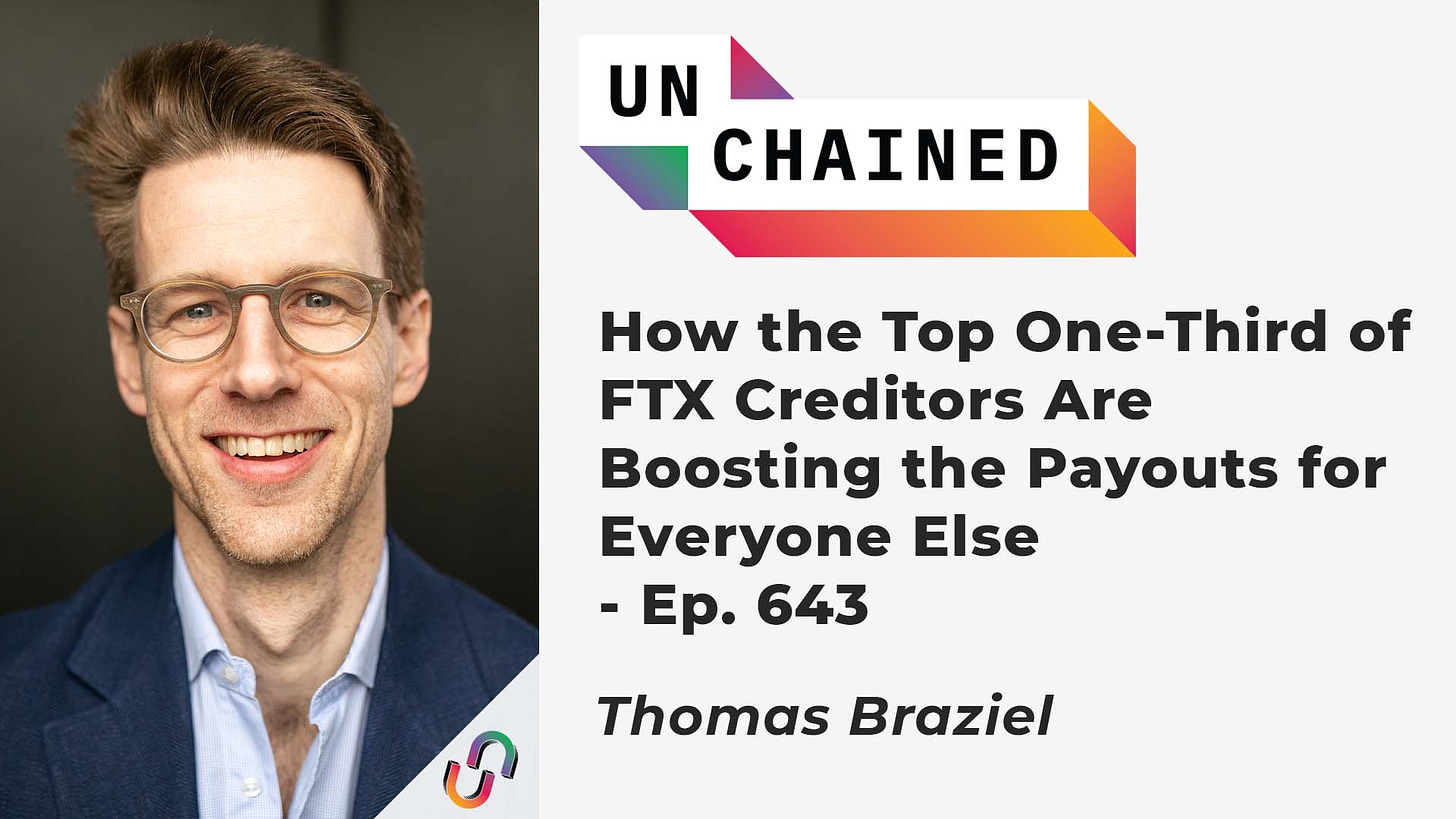Is the FTX Estate Fairly Distributing Its Gains Among Creditors? 🤔
Weekly News Recap: 🚨 Binance's client controversy, 🔄 Ethereum's EIP-7702 momentum, 🏦 Robinhood's SEC woes, 📉 Grayscale's ETF withdrawal, 📈 Fantasy.top and Pump.fun rise, and more!
You are reading the Unchained Weekly newsletter, where we cover all the major news in the crypto space, providing insights into the market's latest trends, regulatory shifts, and technological advancements. Stay informed with your no-hype resource for all things crypto.
If You Like Unchained: Refer us with a friend and earn a Premium subscription!
Thomas Braziel, managing partner at 117 Partners, dives into the draft FTX bankruptcy plan, which was praised for paying out at more than 100% in dollar terms, but has a number of intricacies that are drawing criticisms from creditors—including a group that is urging creditors to vote not.
The episode delves into the nuances of the proposed payout, explaining how the estate was able to pay back more than 100% than the dollar value of the claims, why some creditors are being pitted against each other, and why it might get approved even “over the kicking and screaming” of some creditors.
Braziel gives his insights into the rapid formation of this plan, the controversial role of Sullivan and Cromwell, and the logistical challenges posed by what may end up being paper check payouts.
Listen to the episode on Apple Podcasts, Spotify, Pods, Fountain, Overcast, Podcast Addict, Pocket Casts, Castbox, Google Podcasts, Amazon Music, or on your favorite podcast platform. Or watch it on YouTube.
Weekly News Recap
Binance Faces Criticism for Handling of Allegations Against a High-Value Client
According to a report from The Wall Street Journal, Binance's commitment to thwarting suspicious trading was tested when an internal investigation revealed that a high-profile client, known for a lavish lifestyle including owning a Lamborghini, was manipulating markets. Despite these findings, Binance chose to retain the client and dismiss the investigator who uncovered the malpractice.
This decision sparked concerns among former company insiders, suggesting that Binance prioritized profit generation from large clients over implementing robust market surveillance. Such actions seem contradictory to the platform's stated goal of ensuring a safe and trusted trading environment. The situation reflects a broader issue within the crypto industry, where large exchanges face scrutiny for potentially overlooking manipulative practices to preserve lucrative trading fees.
Binance, however, has denied these allegations, asserting a strong commitment to market integrity and user safety, regardless of the financial stature of its users. A company spokesperson emphasized their rigorous surveillance framework designed to combat market abuse and uphold the platform's safety.

Vitalik Buterin's EIP-7702 Gains Momentum for Ethereum's Pectra Upgrade
Ethereum Improvement Proposal (EIP)-7702, introduced by co-founder Vitalik Buterin and his team, is rapidly gaining traction among developers, suggesting its potential inclusion in Ethereum's next hard fork, named "Pectra." It seeks to enhance Ethereum by allowing externally owned accounts (EOAs) to temporarily transform into smart contract wallets for a single transaction, reverting to their original state thereafter.
The proposal emerges from extensive discussions within the Ethereum community, particularly around earlier improvement proposals like EIP-3074 and EIP-4337. EIP-7702 is designed to refine the path toward what's termed "account abstraction," aiming to convert all EOAs into smart account wallets, thereby boosting both security and user experience.

Lukas Schor, co-founder of wallet infrastructure maker Safe, highlighted EIP-7702's advantages over EIP-3074, noting its leaner approach and compatibility with ERC-4337, which prevents the emergence of fragmented ecosystems within Ethereum. Additionally, EIP-7702 addresses concerns about quantum computing threats by enabling the use of stronger cryptographic schemes and quantum-resistant technologies.
Robinhood Crypto Faces SEC Enforcement Action
Robinhood, a prominent retail trading platform, has received a Wells Notice from the U.S. Securities and Exchange Commission (SEC) regarding the crypto tokens traded on its platform. Issued on May 4, the notice is a preliminary step by the SEC to bring enforcement action, indicating possible violations of securities law.
Robinhood's chief legal officer, Dan Gallagher, expressed confidence in the legitimacy of their listings. He stated: "We firmly believe that the assets listed on our platform are not securities." The company is prepared to defend its stance, with CEO Vlad Tenev indicating readiness to contest the matter in court if necessary.
This move comes amidst a broader SEC crackdown on the digital currency industry, with the regulator asserting that most cryptocurrency tokens are securities. Robinhood, which has previously attempted to register as a special purpose broker-dealer for digital assets, faced a setback in its efforts and has since delisted certain tokens like Solana, Cardano, and Polygon. Following the SEC's action, Robinhood shares experienced initial volatility but ultimately rose by 2%.
Grayscale Withdraws Ethereum Futures ETF Application Amid Regulatory Uncertainty
Grayscale Investments has unexpectedly withdrawn its application for an Ethereum Futures Trust ETF with the SEC, a move that has puzzled many. Initially filed on September 19, 2023, the application was retracted on May 3 after the SEC delayed its decision three times, with a final verdict due on May 30.
James Seyffart, a Bloomberg ETF analyst, commented on the withdrawal, suggesting that the original filing may have been a strategic move by Grayscale. "This was essentially a Trojan horse filing...to create the same circumstances that allowed Grayscale to win the GBTC lawsuit," Seyffart said. However, he also noted that this early withdrawal might have been a way to avoid aggravating the SEC, as it would reduce the regulator's workload.
The broader sentiment around the approval of a spot ether ETF remains pessimistic, with only 7% of market participants on Polymarket believing an approval will occur by the end of May.

Fantasy.top and Pump.fun Surge in DeFi Rankings by Fees Generated
Two relatively new platforms, Fantasy.top and Pump.fun, ascended to the sixth and seventh positions among crypto protocols based on fees generated on Wednesday. These platforms, only a few months old, have quickly amassed significant trading volumes and user engagement.
Fantasy.top, a decentralized exchange (DEX) specializing in trading cards featuring prominent crypto personalities, now sits just behind Tron and ahead of the BNB Smart Chain DEX PancakeSwap in the rankings. Meanwhile, Pump.fun, known for its memecoin launch and trading services, currently occupies the eighth spot.
The game Fantasy Top has turned crypto influencers into Ethereum NFT trading cards. Players earn crypto and in-game prizes by assembling lineups of these cards, with their value driven by real-world Twitter engagement. This inventive approach has captivated Crypto Twitter, leading to a surge in the platform's popularity and fee generation.

Ethena and Bybit Partnership Aims to Boost USDe Growth
Ethena has partnered with the cryptocurrency exchange Bybit to enhance the use of its synthetic dollar, USDe. This collaboration will allow USDe to be used as collateral for trading perpetual futures on Bybit, offering a yield on this collateral—a feature uncommon among other stablecoins such as USDT.
Bybit's integration includes trading BTC, ETH, and SOL through its Unified Trading Account (UTA), as well as adding BTC/USDe and ETH/USDe spot pairs. Additionally, USDe will be part of Bybit's "Earn" platform, facilitating launchpool farming for new tokens.
Despite a promising start with rapid market cap growth to $2.39 billion, USDe's growth has recently stagnated. Guy Young, founder and CEO of Ethena Labs, highlighted the potential impact of this partnership on the stablecoin market, suggesting it could challenge the dominance of traditional stablecoins by providing benefits for crypto-native users and optimizing trading efficiency.

MODE's Price Plunge HighlightsChallenges Among Airdrops
The market's latest airdrop saw Mode's native token drop over 60% immediately after release, signaling potential issues with the overall airdrop strategy. Other platforms such as Kamino, Renzo, Parcl, Wormhole, and friend.tech have experienced similar declines post-airdrop, underscoring a growing skepticism about the effectiveness of this approach.
Recently, community reactions have played a significant role in shaping airdrop outcomes. For instance, the Eigen Foundation faced intense backlash for its initial distribution plan, prompting a revised allocation to appease angry users.
Uniswap founder Hayden Adams has weighed in on the topic, advising projects against being stingy with token distributions and urging them to create real liquidity from day one.







